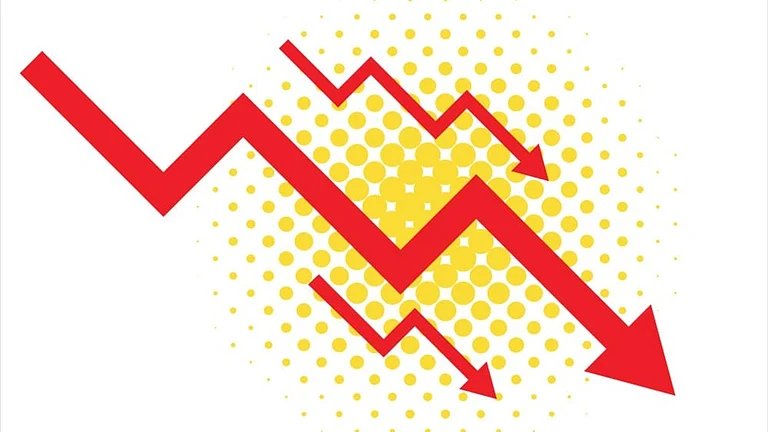Indian equity benchmarks, the BSE Sensex and the Nifty 50 tanked over 3 per cent each in intraday trade on Monday, August 5, following the global sell-off after the concerns around US recession grew and rising tensions in the Middle East added to investors’ woes. The Sensex opened 2,400 points lower and Nifty slipped below the 24,300 level due to selling in heavyweights on Monday morning.
At 12:40 AM, the Sensex was trading 78,428.60, down by 2,553.49 or 3.13 per cent while Nifty50 fell 756 points or 3.06 per cent to 23,961 points.
The total market capitalisation of all the BSE-listed companies declined to nearly Rs 442 lakh crore from nearly Rs 457 lakh crore in the previous session, making investors lose nearly Rs 15 lakh crore in today’s session.
US futures were in the deep red with Nasdaq futures down from 2 per cent while the Nasdaq is hovering 10 per cent down from its all-time highs. Asian stocks stumbled on the backs of the US economic slowdown, an extended route in Japanese stock markets, and rising tension in the Middle East impacted the market sentiment globally.
On Monday, several regional equity indexes faced significant declines, with Japan and the tech-focused markets of Taiwan and Korea experiencing the heaviest losses, each seeing their benchmarks drop by more than 7 per cent. The MSCI Asia Pacific Index fell by as much as 4.3 per cent, heading towards a technical correction and threatening to wipe out all its gains for the year.
Here are some of the factors behind the sell-off today:
1. Fears over US Recession: Worries over a looming US recession further intensified after the country experienced a massive hiring slowdown in July. According to the latest US Labor Department report, the nonfarm payrolls increased by just 114,000 jobs last month, compared to the 215,000 jobs monthly average of last year. Additionally, unemployment has jumped to around 4.3 per cent the highest since October 2021.
"The rally in the global stock markets has been driven mainly by consensus expectations of a soft landing for the US economy. This expectation is now under threat with the fall in US job creation in July and the sharp rise in US unemployment rate to 4.3 per cent," said VK Vijayakumar, Chief Investment Strategist of Geojit Financial Services.
2. Bank of Japan Policy: The Japanese Yen has seen a significant appreciation of nearly 10 per cent against the US Dollar over the last three weeks after multiple triggers from the Bank of Japan and the local government. The Bank of Japan raised the benchmark interest rates to around 0.25 per cent from the earlier range of 0 per cent to 0.1 per cent, marking the highest level since 2008. The appreciation in Yen has resulted in a significant unwinding of the “carry trade,” which has been a popular trading strategy within the currency market and had an impact on the financial markets as well.
3. Rising Iran-Israel Tensions: Geopolitical tensions impacted the market sentiment as concerns grew over the potential for attacks from Iran and its regional allies. Iran, Hamas and Hezbollah have vowed to retaliate against Israel’s assassination of Hamas chief and Hezbollah’s military chief.
Activities in the Middle East will be closely watched for cues on crude prices as any escalation in the ongoing tensions would send prices surging. Currently, oil prices are at 8-month lows.
"Geopolitical tensions in the Middle East also are a contributing factor. Another significant factor is the unwinding of the Yen carry trade which is bleeding the Japanese market. The crash in Nikkei by above 4 percent, " according to Vijayakumar.
4. Weak Q1 Earnings: Despite Q1 Earnings being in line with market expectations, the results season so far hasn’t given any significant positive surprises to drive the market rally. As we reach the halfway point of Q1, earnings growth for Nifty companies appears sluggish amid a poor deal environment, record heatwave, and lacklustre demand. So far, 30 out of the 50 Nifty companies have reported their Q1 earnings, showing a median sales growth of 10.7 per cent YoY, while overall profits rose by 8 per cent YoY.
“This tepid earnings growth, if echoed by the remaining companies, could impact the broader market, especially as the Nifty is already trading at a PE of 23 times on a TTM basis,” said Krishna Appala, Sr Research Analyst at Capitalmind Research.
“With global markets leaning towards a risk-off scenario, as evidenced by sharp sell-offs in the Nasdaq and Nikkei, it’s crucial for earnings to accelerate. If earnings growth doesn’t pick up, the market may face a risk of near-term consolidation,” Appala added.
5. Overvaluation Concerns: Worries around stretched valuations in the Indian stock market and expectations for a healthy correction have also impacted the market sentiment. Last week, India’s market capitalisation to GDP ratio, popularly known as the Buffet Indicator, had jumped to a record high of 150 per cent.
“Valuations in India, driven mainly by sustained liquidity flows, continue to be high, particularly in the mid and small caps segments. The overvalued segments of the market like Defence and Railways are likely to come under pressure,” Vijayakumar said.
He added that the buy on dips strategy which has worked well in this bull run, is likely to be threatened now. Investors need not rush to buy in this correction. Wait for the market to stabilise.
The current PE (price to earnings) ratio of Nifty 50 is 23.1, above its two-year average PE of 21.9. The index's PB (price to book) ratio, at 4.17, is slightly above its two-year average PB of 4.09, according to data from equity research platform Trendline.
In addition, the markets are lacking any fresh triggers that could drive the momentum.
However, Tanvi Kanchan, Head of UAE Business & Strategy at Anand Rathi Shares and Stock Broker says this sell-off is more of a short-term volatility by way of profit booking and is no indicator of any long-term panic mode set in the Indian equities.
“For investors looking at entering the equity market, a staggered entry during volatile periods can be considered,” Kanchan added.
































